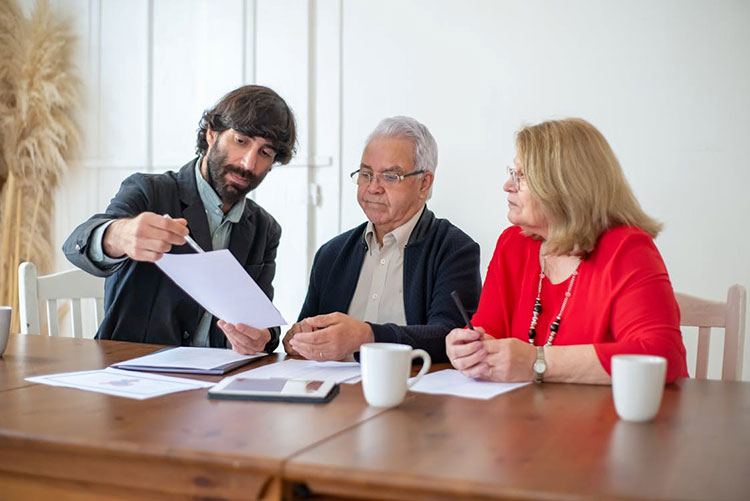How to Use Guardian ad Litems (GALs) in Your Divorce

Magnuson Lowell Blog
Each week we post a blog about relevant legal issues. Glance through our various topics to learn more about a particular legal situation.
These articles are for limited informational purposes only and are not, nor are they intended to be, legal advice. You should not rely on this information for your case and should consult with an attorney for advice regarding your individual situation.
Most Recent Posts ...
Posted on: 3/31/2025
Posted on: 3/24/2025
Posted on: 3/17/2025
Posted on: 3/10/2025
Search All Blog Posts
Blog Post Archive Categories
- Reconciling After a Divorce Filing
- Dividing Retirement in Divorce - Do I Need a QDRO?
- Options for Dealing with Real Estate in Your Washington State Divorce
- Positive Thoughts After Losing a Family Law Motion
- Supervised Visitation for Washington Parenting Plans: What You Need to Know
- Filing for Immediate Restraining Orders in King County
- (Redmond/Criminal Defense) Time Matters for a DUI
- (Redmond/Criminal Defense) Field Sobriety Tests - What Not to Do
- (Redmond/Criminal Defense) - The (Redmond/Criminal Defense) - The Ability to Remain Silent
- Battling Father Time: Crafting Your Legacy with Precision
- Tips for Talking to Your Family About Your Estate Plan
- How to Choose Your Personal Representative for your Will
- What is a Trial Continuance in Washington State?
- Renewing a Domestic Violence Protection Order in Washington State
- Little Known Washington Driving Laws
- Divorce Mediation Tips for High-Conflict Couples
- Dealing with Small Business During a Divorce
- The Role of Financial Advisors in High-Asset Divorces
- Why Expediency is Important After Your Car Accident
- Understanding Independent Medical Examinations (IMEs) in Washington State
- It only takes 3 seconds...
- Gotta love our court system!
- (Redmond/Crazy Lawsuit) The Walking Dead: or Not!
- (Redmond/Crazy Lawsuit) Here Comes Football - and Litigation
- Honoring Our Heroes: A Thank You to All Who Have Served!
- Happy Halloween from Magnuson Lowell
- 10 Tips You Need To Know Before Getting On A Motorcycle
- Top 10 Tips You Need To Know Before Getting On A Motorcycle
- Top 10 Tips Riders Need To Know Before Getting On A Motorcycle
- In a Car Collision...Now What?
- Contentious custody battles where parents cannot agree on parenting plans.
- Allegations of abuse, neglect, or domestic violence.
- Concerns about a parent’s mental health, substance abuse, or fitness to care for the child.
- Situations involving a child with special needs, where the court requires expert insight into what custody arrangement best serves the child.
- Interviewing Parents: The GAL will meet with both parents to gather their perspectives and understand their proposed parenting plans.
- Meeting the Child: The GAL will talk to the child in an age-appropriate manner to assess their thoughts, feelings, and experiences.
- Home Visits: The GAL may conduct home visits to evaluate living conditions and the environment where the child would reside.
- Interviewing Other Relevant Parties: This could include teachers, counselors, relatives, or healthcare providers who have insight into the child’s well-being.
- Reviewing Records: The GAL may review school reports, medical records, police reports, and other documents that provide a fuller picture of the child’s situation.
- Custody and Visitation Recommendations: Suggestions about which parent should have primary custody, what the visitation schedule should look like, and whether supervised visits are necessary.
- Parental Fitness Assessments: Insights into a parent’s ability to care for the child, particularly in cases involving substance abuse, domestic violence, or mental health concerns.
- Special Needs Considerations: Recommendations tailored to the child’s educational, medical, or emotional needs.
- Be Honest: Provide truthful and accurate information. Misleading the GAL can harm your credibility and case.
- Focus on Your Child’s Best Interests: Keep the focus on what is best for your child, not on grievances with your ex-spouse.
- Cooperate Fully: Respond promptly to the GAL’s requests for interviews, documents, or home visits.
- Demonstrate Stability: Showcase your ability to provide a stable, safe, and supportive environment for your child.
How to Use Guardian ad Litems (GALs) in Your Divorce

Navigating a divorce is challenging, especially when children are involved. In contentious custody disputes, the court may appoint a Guardian ad Litem (GAL) to help determine what is in the best interests of the child. Understanding the role of a GAL, how their investigation works, and the recommendations they provide can make the process less intimidating and help you achieve the best possible outcome for your family.
What is a Guardian ad Litem (GAL)?
A Guardian ad Litem (GAL) is a court-appointed advocate who represents the best interests of a child in family law cases. GALs are often used in divorces, custody disputes, or situations where allegations of abuse, neglect, or parental unfitness arise. They serve as a neutral third party who investigates the case and provides the court with recommendations regarding parenting plans, custody, and visitation schedules.
In Washington State, GALs can be attorneys, mental health professionals, or other trained individuals certified to act in this capacity. Their role is to ensure that the child’s needs are prioritized, even in situations where parents cannot agree.
When is a GAL Appointed?
A GAL is typically appointed in cases where the court determines that additional information or investigation is needed to make decisions about a child’s welfare. Common scenarios include:
Either parent can request a GAL, or the judge may appoint one independently if they believe it is necessary to protect the child’s interests.
How Does a GAL Conduct Their Investigation?
Once appointed, the GAL conducts a thorough investigation to understand the child’s circumstances and needs. This process includes:
Throughout the investigation, the GAL maintains a neutral stance, focusing solely on the best interests of the child.
What Recommendations Does a GAL Make?
At the end of their investigation, the GAL will submit a written report to the court. This report includes:
The court gives significant weight to the GAL’s recommendations, though they are not binding. Parents can challenge the GAL’s findings during court proceedings, but the report often has a substantial impact on the judge’s final decision.
How to Work with a GAL Effectively
If a GAL is appointed in your case, it is essential to work with them cooperatively and transparently. Here are some tips:
The Value of a GAL in Custody Disputes
While the involvement of a GAL may initially feel intrusive, their role is invaluable in ensuring that decisions about custody and visitation are made in the child’s best interests. They bring a neutral, child-focused perspective to complex family dynamics, helping courts arrive at fair and informed outcomes.
Final Thoughts
If you are facing a divorce or custody dispute and a GAL has been appointed, it is vital to understand their role and cooperate fully throughout the process. An experienced family law attorney can help you navigate the complexities of working with a GAL and advocate for your parental rights in court.
At Magnuson Lowell, P.S., we understand the emotional challenges of custody disputes and work closely with clients to protect their families’ best interests. If you have questions about GALs or need assistance with your divorce case, contact our team for a free telephone case evaluation.




